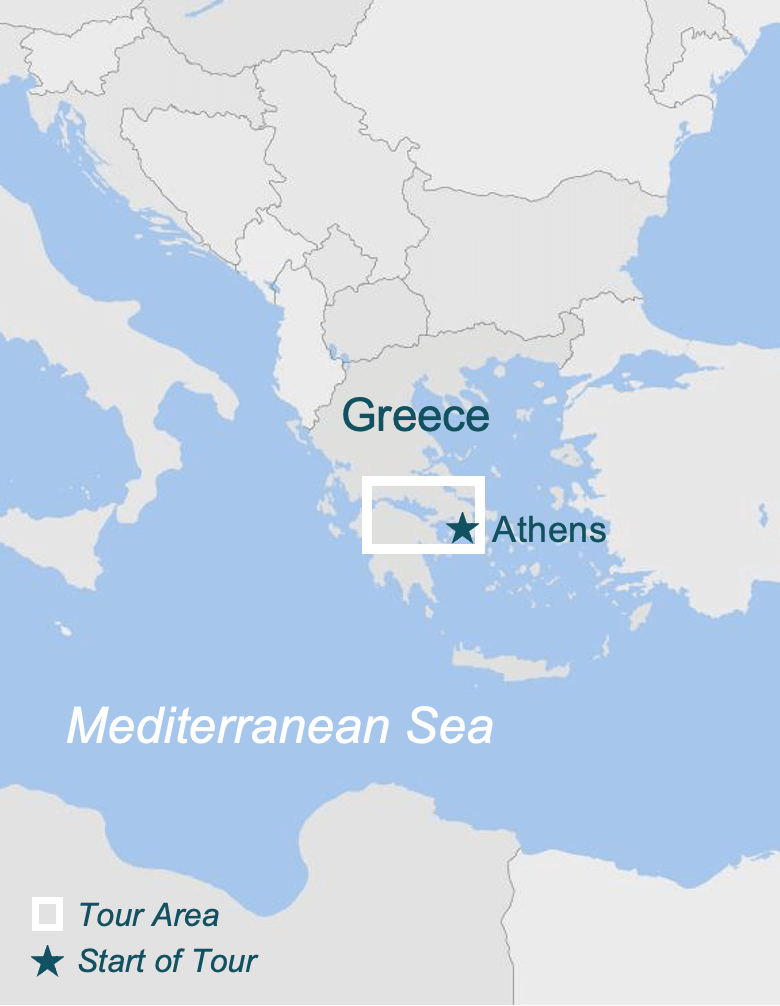

Geology and Archaeology in the Gulf of Corinth, Greece
NO SINGLE SUPPLEMENT FOR SOLO TRAVELLERS. A tour of Classical Greece to experience the geology and the ancient history of Athens, Corinth and the Achaean League, and how these combined to influence Greek civilisation and culture
Highlights
- Visit the iconic Acropolis to see the Parthenon and other sites in Athens
- Discover recent ideas on how geology and tectonic faults impact Greek history and culture as well as how geology and landscapes are now thought to be involved in the origins of many ancient Greek myths
- Explore the history, breath-taking scenery and geology of the Gulf of Corinth
- Travel by luxury mini-coach through the Peloponnese mountains
- Relish the exceptional Greek hospitality and food in local tavernas
- Enjoy new insights into the famous Greek centers of Mycenae and Ancient Corinth, sample local wines and take some pleasant short hikes
- The activity level is rated as EASY (see our definitions here)
- The tour begins and ends in Athens, Greece
Overview
The unparalleled wealth of culture and history in Greece has been influenced by its geology and landscapes in ways that are often overlooked. This six-day tour will take you on an extraordinary journey to discover how geologists ‘read the rocks’ to uncover a fascinating earth history and how this has impacted the course of western civilisation.
The tour begins and ends in Athens, where participants can enjoy guided visits to iconic sites such as the Acropolis to see the Parthenon, but with the added insight into how the landscape and geology have shaped their history. Travelling by luxury mini-coach to the Gulf of Corinth and the beautiful Peloponnese mountains, we will explore the fascinating symbiosis between the natural environment and early culture. The changes to the Earth’s geology have influenced the location and impact of events throughout Greek history, from the pre-Classical Mycenean civilization to as recently as World War Two.
Experience the breath-taking Gulf of Corinth Rift; there are few better places to witness the impact of active faults on the evolution of a rift landscape than in this spectacular ‘natural laboratory’. Observe how the rise and demise of early civilisations were influenced by geological events; hear how earthquakes and fluid flow along faults are now considered by many to explain the magical powers of ancient oracles.
Spend time on short hikes with spectacular views, wine tasting in a local vineyard, or simply sitting in a town square soaking up the sunshine over a coffee or an ouzo, before enjoying an evening meal in a specially chosen local taverna. This is a holiday to fascinate and enthral amidst stunning landscapes and history. The tour is ideal for anyone with an interest in the culture and history of Greece and its relationship between the natural world, past, present and future.
Tour Map
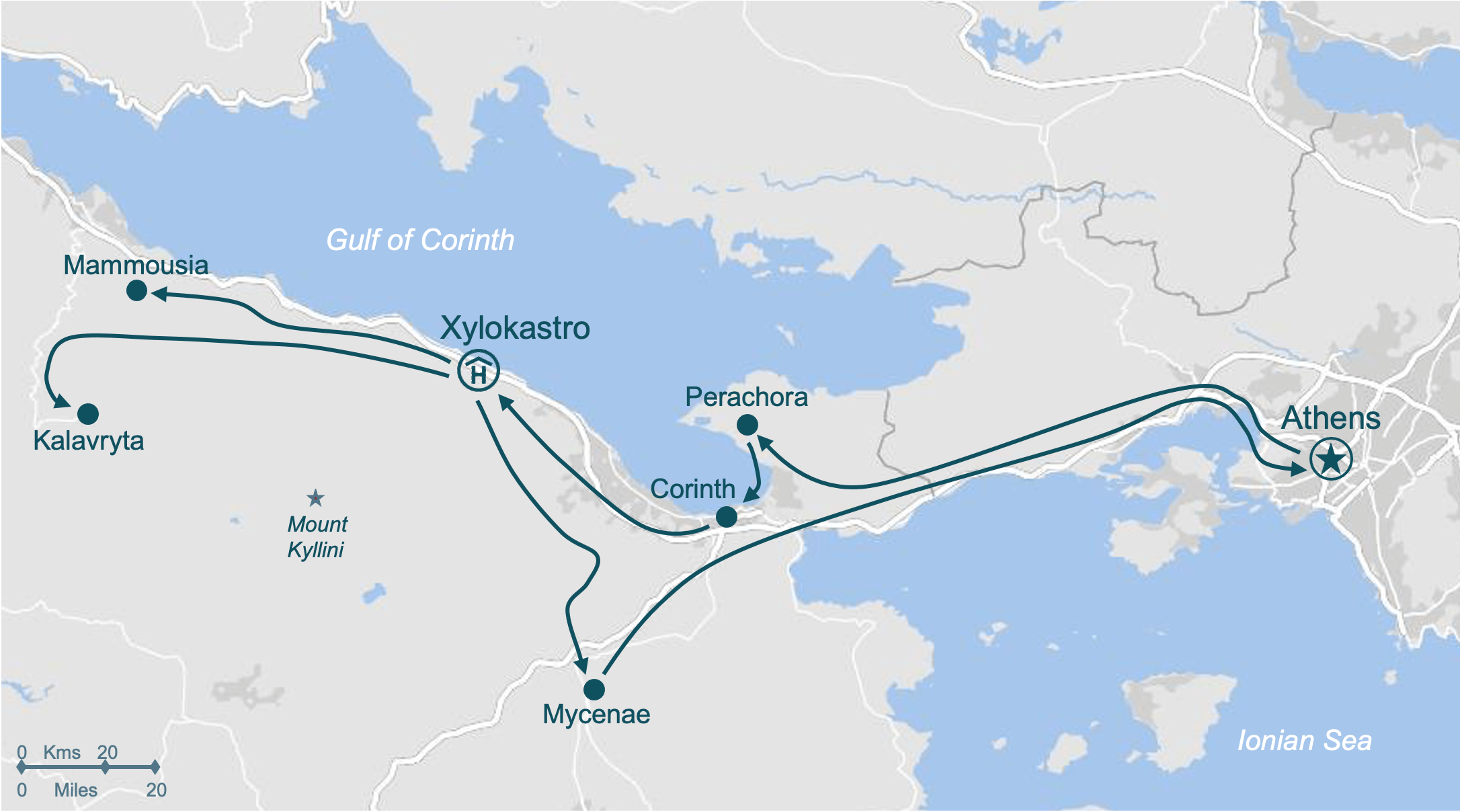
Day 1 – Arrival
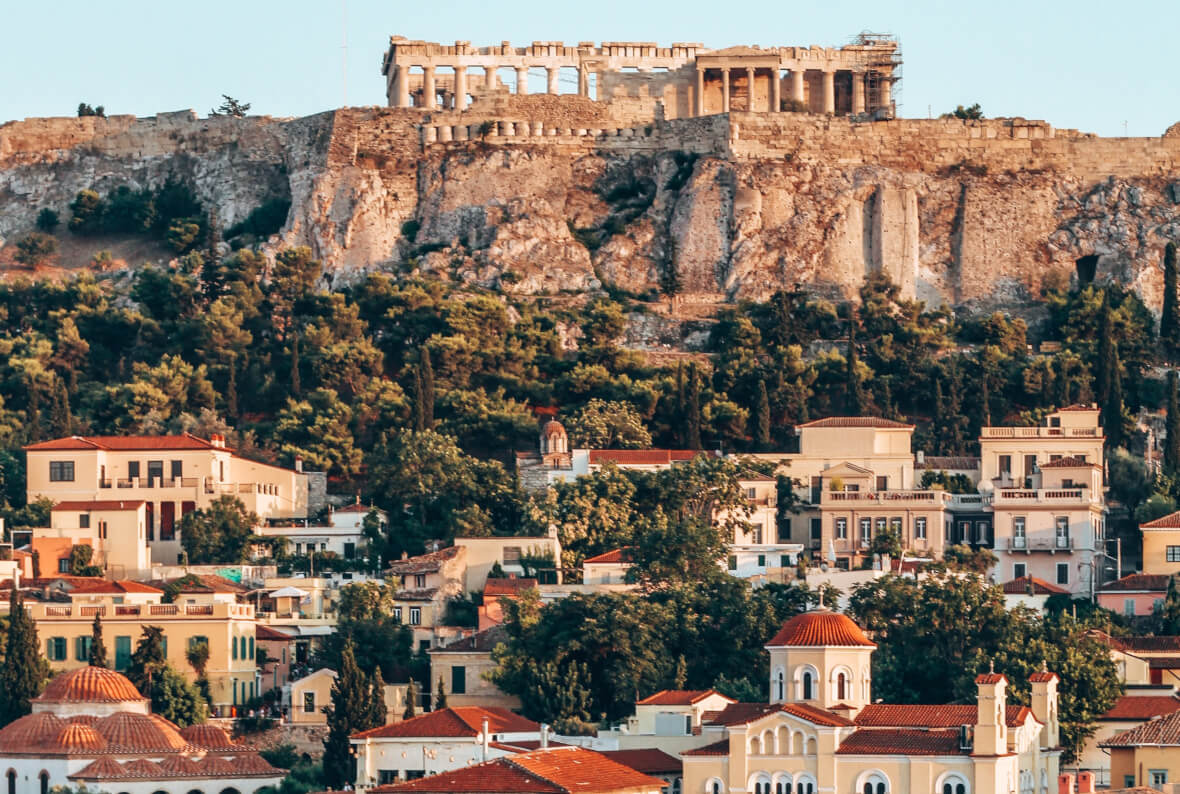
Participants meet at the hotel in Athens for an introduction to the tour and to members of the group. The hotel is a 30-minute taxi ride from the Athens International Airport.
Overnight in Athens. Group dinner.
Day 2 – Athens
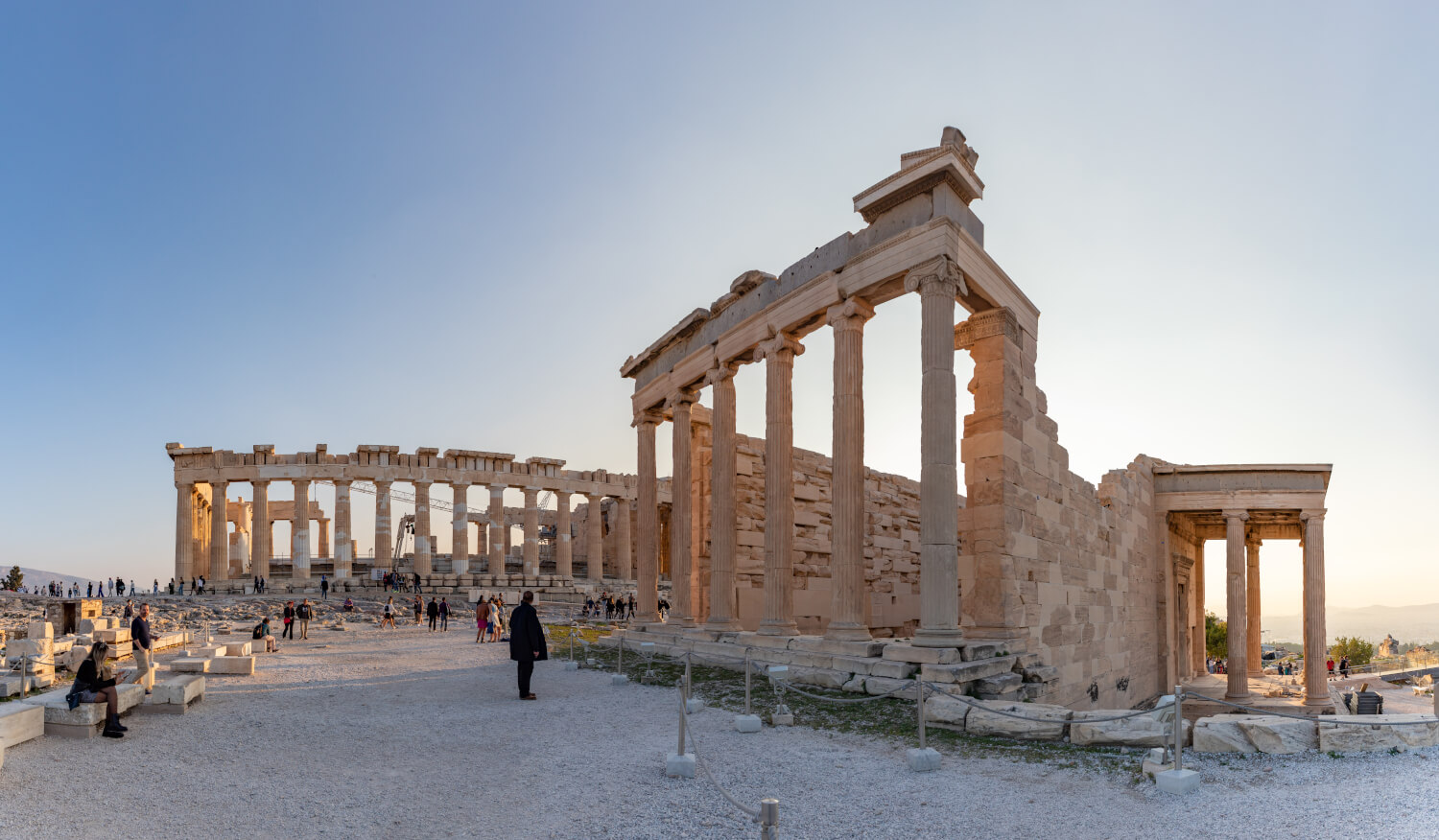
The first full day will be in Athens and will include a guided tour and visits to the world-famous historical sites of the city. Time will be spent at a combination of the World Heritage Site of the Acropolis, Parthenon and the National Archaeological Museum. The focus of the day will be to spend time at these treasures and to highlight their historical links with geological processes. An interesting aspect of the Acropolis, for example, is that the citadel is built on top of a limestone hill which is not where the limestone formed. The stronger limestone that defines the hill has, surprisingly, been transported ~120km by geological processes from where it originated.
Overnight in Athens. Free evening.
Day 3 – Athens to the Perachora Peninsula and on to Xylokastron
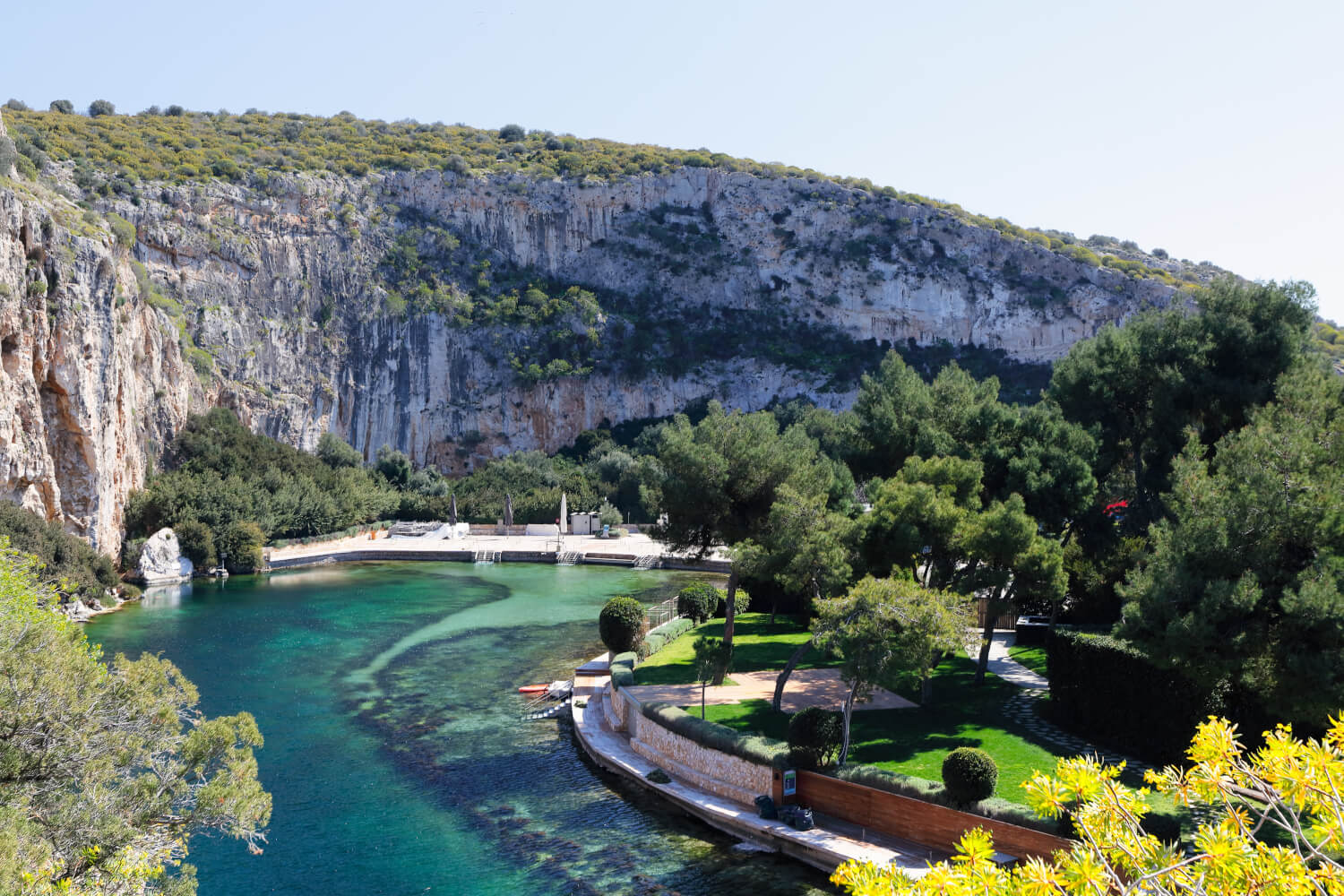
Today the tour will travel west from Athens to the Perachora peninsula at the eastern end of the Gulf of Corinth and visit the Heraion archaeological site. This is a 9th century BCE sanctuary to the goddess Hera that is now recognised as a fascinating example of the influence of plate tectonics, continental movement and geological faulting on landscapes and local history. All of Greece has moved slowly to the southwest because Africa is pushing north, and the resulting earthquakes, faults and uplift around the Gulf of Corinth Rift have controlled the landscape evolution and the sites selected for temples and cities.
The Hera sanctuary also illustrates the intriguing links between the ancient Greek Oracles, earthquakes and the location of springs, which were so important to early cultures. The tour will investigate why fault activity may have dried up the springs and stopped the Greeks from visiting the sites that the local Oracles depended on.
After lunch at Lake Vouliagmeni the tour will visit the nearby active Pisia Fault, where a spectacular fault surface exposes evidence of recent earthquake movements.
The rest of the afternoon will be spent in Corinth, once one of the largest and most important cities in Greece, and will focus on the spectacular temples to Apollo and Poseidon. There will be time for a guided visit to the local Museum to discover more about Corinth during Greek, Roman and Byzantine times.
The day finishes with a short drive to the main accommodation base for the tour, in Xylokastron, on the southern shore of the Gulf of Corinth.
Overnight in Xylokastron. Group dinner.
Day 4 – Kalavryta
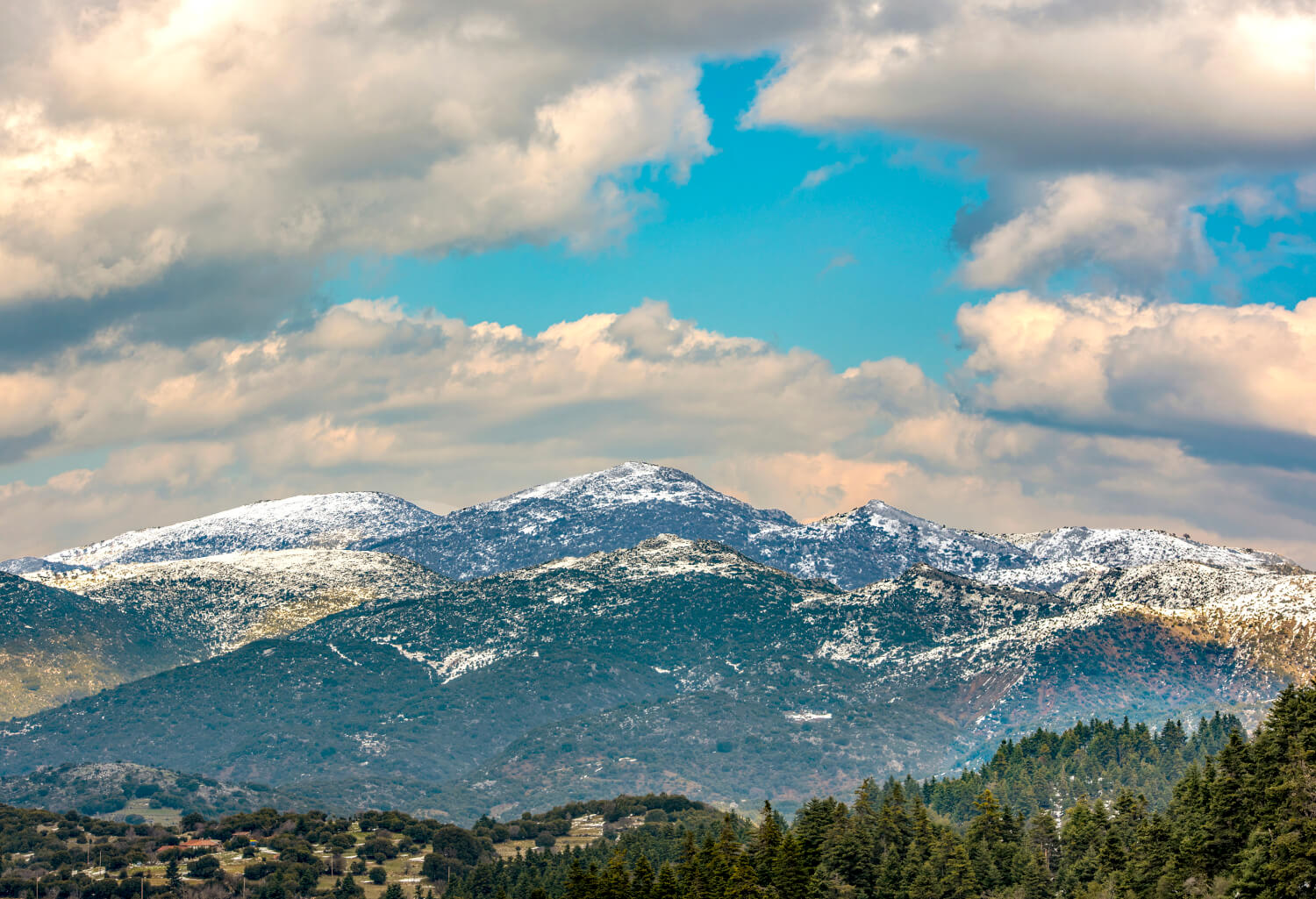
The day starts with a drive up into the mountains on the south side of the Gulf of Corinth to Kalavryta, the southern margin of the Corinth Rift System. Wonderful views of the rift reveal insights into how tectonics has allowed a horizontal extension of the crust here, estimated at 6km to 11km. This area is also perfect to reveal how geologists ‘read the rocks’ to uncover the existence of ancient lakes, once occupying the Gulf of Corinth, and even how fragments in local ash layers can be traced back to distant volcanoes!
Lunch will be in Kalavryta (760m), in the Chelmos – Vouraikos Geopark, below the slopes of Mount Helmos (2355m) and close to the Waters of Styx, the fabled river entrance to Hades.
In the afternoon the tour returns north back to the coast. Stops will illustrate how kilometre-scale fault blocks along the rift control the developing drainage system to produce the present dramatic landscapes of the Dhoumena area. The day will conclude with a visit to the ancient Mega Spelio Monastery, founded in 362 CE used by early Christian hermits and the site of a World War Two massacre.
Overnight in Xylokastron. Free evening.
Day 5 – Mamoussia-Pirgaki Fault Zone and Selinountas winery
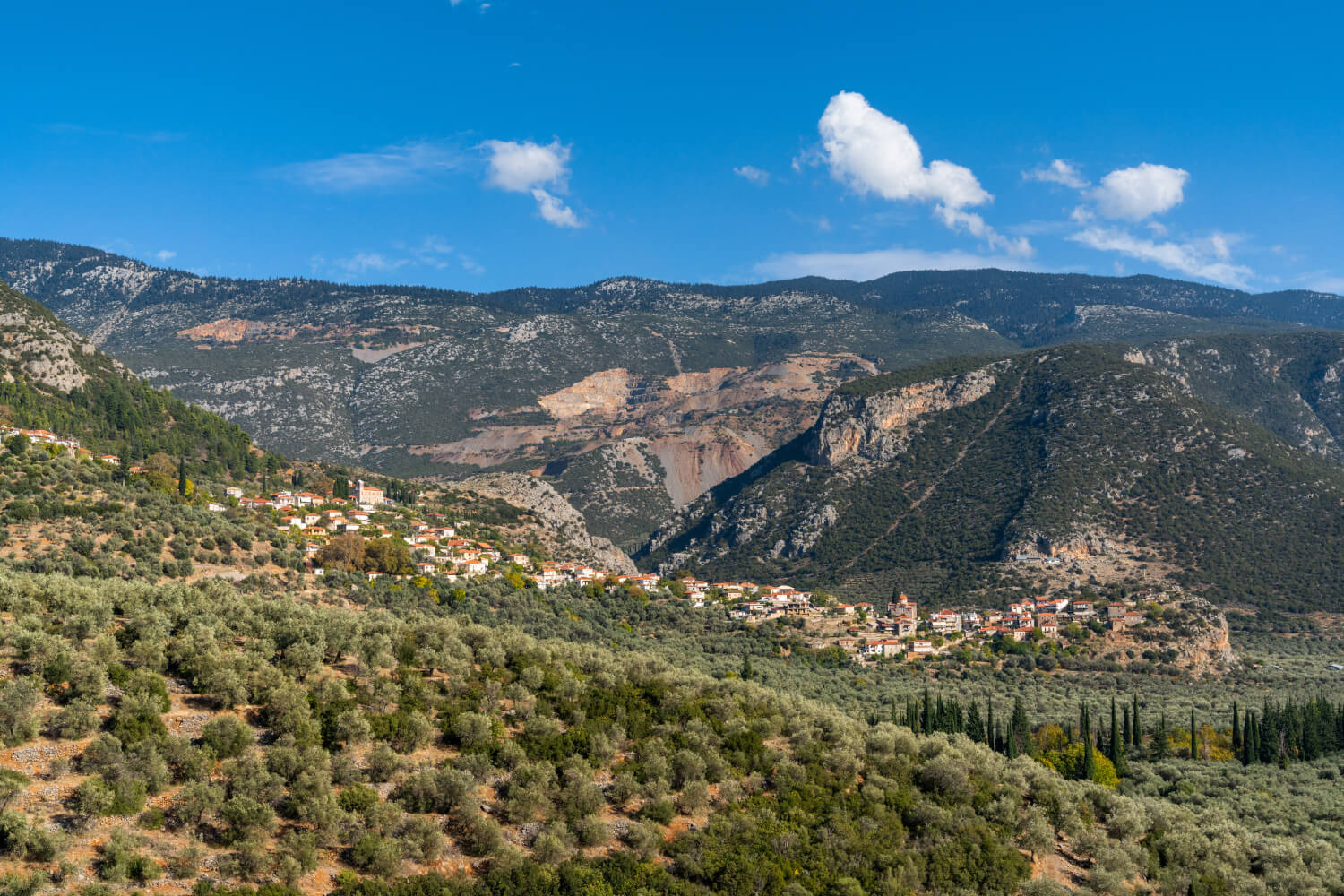
This morning the tour visits the mountains, scenery and ancient cities on the south of the Gulf of Corinth. The area illustrates how rifts form during crustal stretching and records the birth, growth and death of a major fault zone, the Mamoussia-Pirgaki Fault. The tour will assess how geological faulting impacts the evolution of landscapes and drainage that can help or hinder cultural development.
After lunch at Eleonas the tour continues with spectacular views of the local landscapes and a visit to the remote village of Mamoussia, which was close to the location of the ancient city of Boura, destroyed by an earthquake in 373 BCE. Evidence for the rebuilding of the city as well as the displacement of the ancient polis of Eliki provides another fascinating example of how geology, earthquakes and quake-related floods can impact on human activities and settlement.
The day will end with a visit to the Selinountas winery for some wine-tasting and a discussion on how geology influences the wine production and, some argue, the taste.
Overnight in Xylokastron. Free evening.
Day 6 – Mycenae, the Corinth Canal and return to Athens
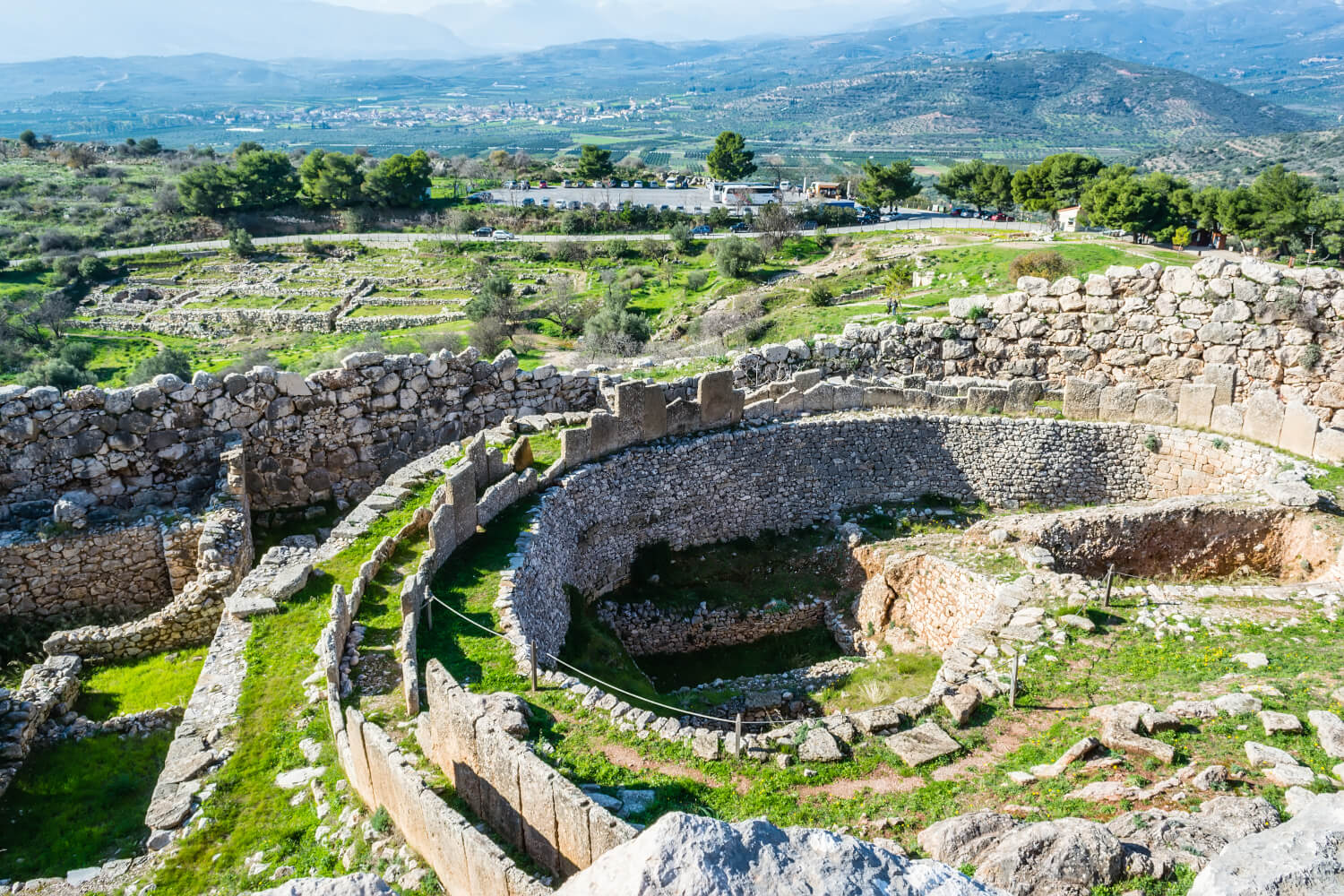
The tour starts with a visit to the famous ancient city of Mycenae where a number of intriguing geological interactions with early Greek culture are apparent. The tour will review the advantages and disadvantages of cities being close to active faults such as access to springs vs. the risk of earthquake and will assess the evidence that earthquakes contributed to or caused the end of Homeric Greek civilisation.
The tour will have lunch at the Isthmia Taverna overlooking the Corinth Canal.
A canal through the isthmus was first proposed in the 7th century BC and finally constructed between 1882 and 1893. The tour will walk along the northeast bank of the canal to observe how the walls have responded to the wakes of shipping, earthquakes and sea-level changes over years.
At the end of the day the tour will travel back to Athens.
Overnight in Athens. Final group dinner.
Day 7 – Tour ends
Participants are free to return home or to continue exploring Athens and Greece.
Note: this provisional itinerary is subject to change as specific locations and accommodations release more information regarding access for the coming year.
Activity Level and Terrain
The activity level is rated as EASY (see our definitions here). The tour involves a mixture of near-roadside stops together with short walks (< 2km / 1.6 mi) with modest ascents (<100m / 330 ft). Many of the stops will involve short walks around managed tourist sites. The short hikes will include tracks with uneven ground, so ankle-supporting lightweight walking boots are recommended. We recommend clothing for a range of warm daytime to cool evening temperatures, with a lightweight waterproof in case of the odd shower. The tour will run in the late autumn and early spring seasons. Temperatures in the high 20soC / 80soF are possible.
Travel in Greece will be by luxury mini-coach.
The Tour Includes/Excludes
The Tour Includes:
- The services of your Tour Leader and Tour manager, who will each be with the group throughout the tour.
- Transportation costs from the start to the end of the tour.
- All accommodation costs for the nights stated, all rooms double with no single supplement.
- All breakfasts, lunches and dinners, except for the three marked “free evening”.
- Entry fees, local guide fees and activity fees, where arranged as part of the tour.
The Tour Excludes:
- Extra or optional activities not described in the tour.
- Personal expenditures, alcoholic drinks with your meal, bar bills, laundry bills, souvenirs and the cost of meals on free evenings.
- Transportation to the start venue or from the end venue of the tour.
- Passport and visa fees.
Participants are required to carry their own health and travel insurance in case of accident or unforeseen circumstances.
Alternate Activities
Alternate arrangements can be made for participants who might wish to avoid any particular walk or activity.
Accommodation
Nights 1 and 2: 4 star hotel, Athens
Night 3, 4 and 5: Sikyon Coast Hotel & Resort, Xylokastron
Night 6: 4 star hotel, Athens
Note: If required for reasons beyond our control, GeoCultura reserves the right to substitute alternate accommodations of equal or higher quality.
Q. Is there a supplement for single rooms?
A. No single supplement, solo travellers will be allocated a double room in each hotel.
Deposit and Payment Terms
Deposit: A deposit of 10% of the tour price is due upon registration for a tour.
Final payment: Full payment is due 60 days before a tour begins, or upon registration if within the 60-day window.
Cancellation by participant: A participant may cancel a registration after securing a confirmed place on a tour for any reason. The following refund terms will apply:
- Greater than 60 days before tour begins: Any monies paid plus half of the deposit will be refunded
- 30 to 59 days before tour begins: 35% of tour price will be refunded
- 15 to 29 days before tour begins: 25% of tour price will be refunded
- Within 14 days of tour or during the tour: No monies will be refunded
Cancellation by GeoCultura: GeoCultura reserves the right to cancel any tour due to low enrolment, inability to run the tour or concerns about the safety, health or welfare of participants. If a tour is cancelled before it begins, all monies paid will be refunded (including any deposit).
Please refer to our Terms and Conditions page for additional details.
Richard Collier
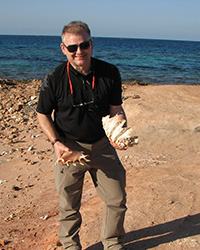
Richard Collier currently resides in Yorkshire, England. He is Senior Lecturer in Tectonics and Sedimentation at Leeds University and runs a geological consultancy, Collier Consulting Ltd.
His core research interests focus on achieving a holistic understanding of sedimentary processes and interactions between fault evolution and sedimentation within active continental rifts, and across the rift to continental margin transition. Current projects continue his established research in the Gulf of Corinth Rift and the Red Sea Rift.
Richard has published extensively on the Corinth Rift, including contributing to The Gulf of Corinth (Classic Geology in Europe series), and has guided numerous groups through the area.
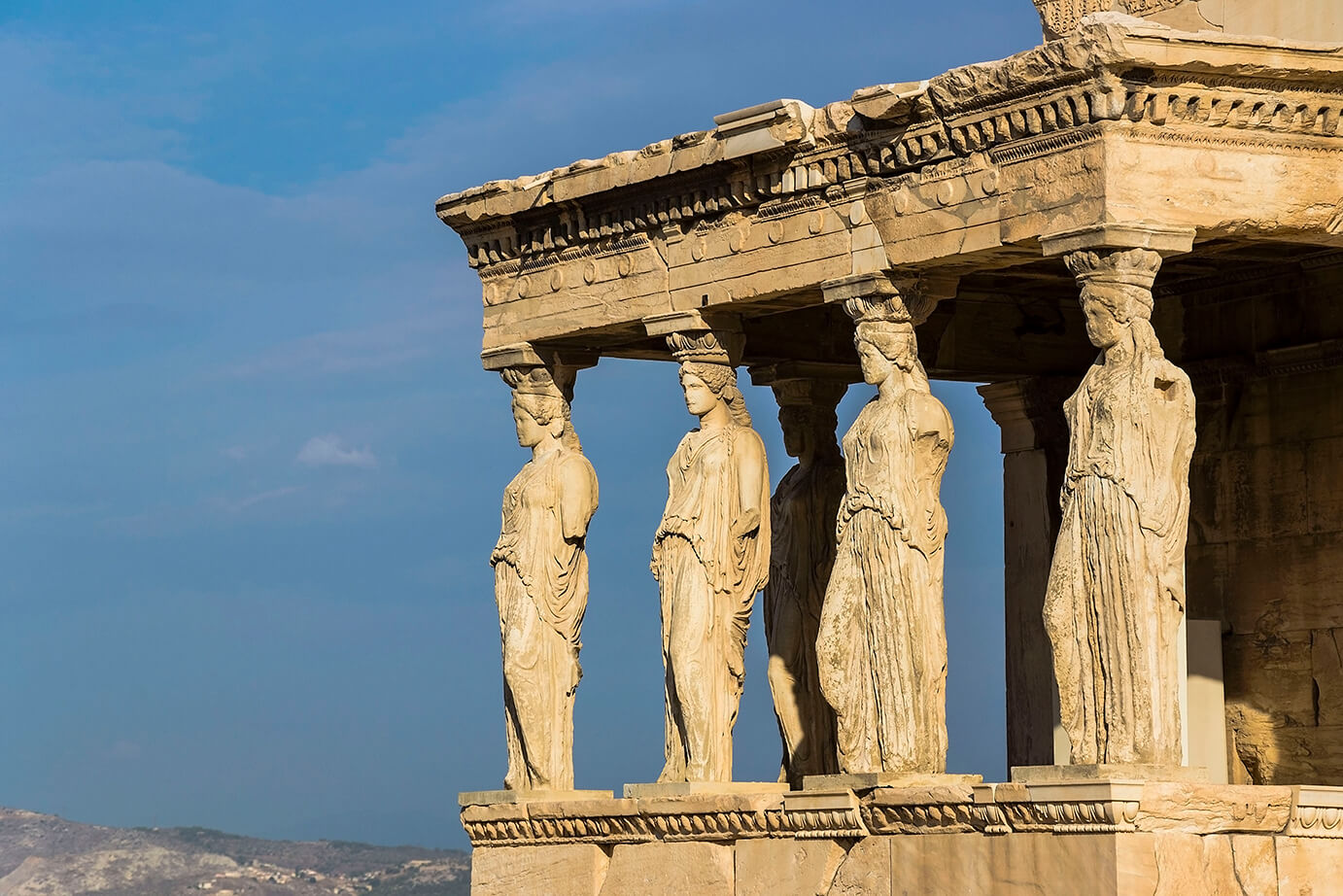
The Caryatid Porch of the Erechtheion in Athens.
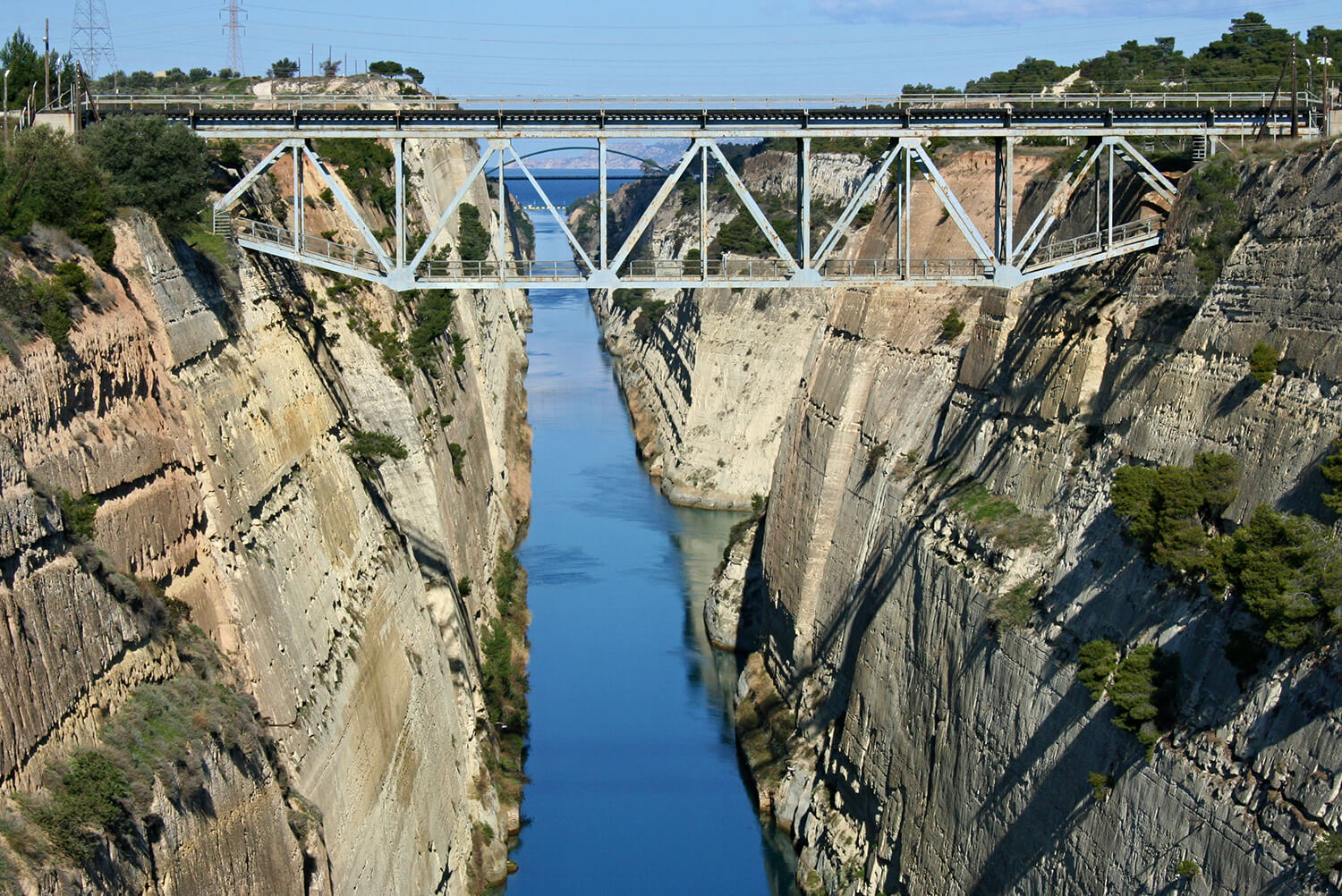
The man-made Corinth Canal, completed in 1893, separates the Peloponnese from the Greek mainland.

The town of Eleonas.
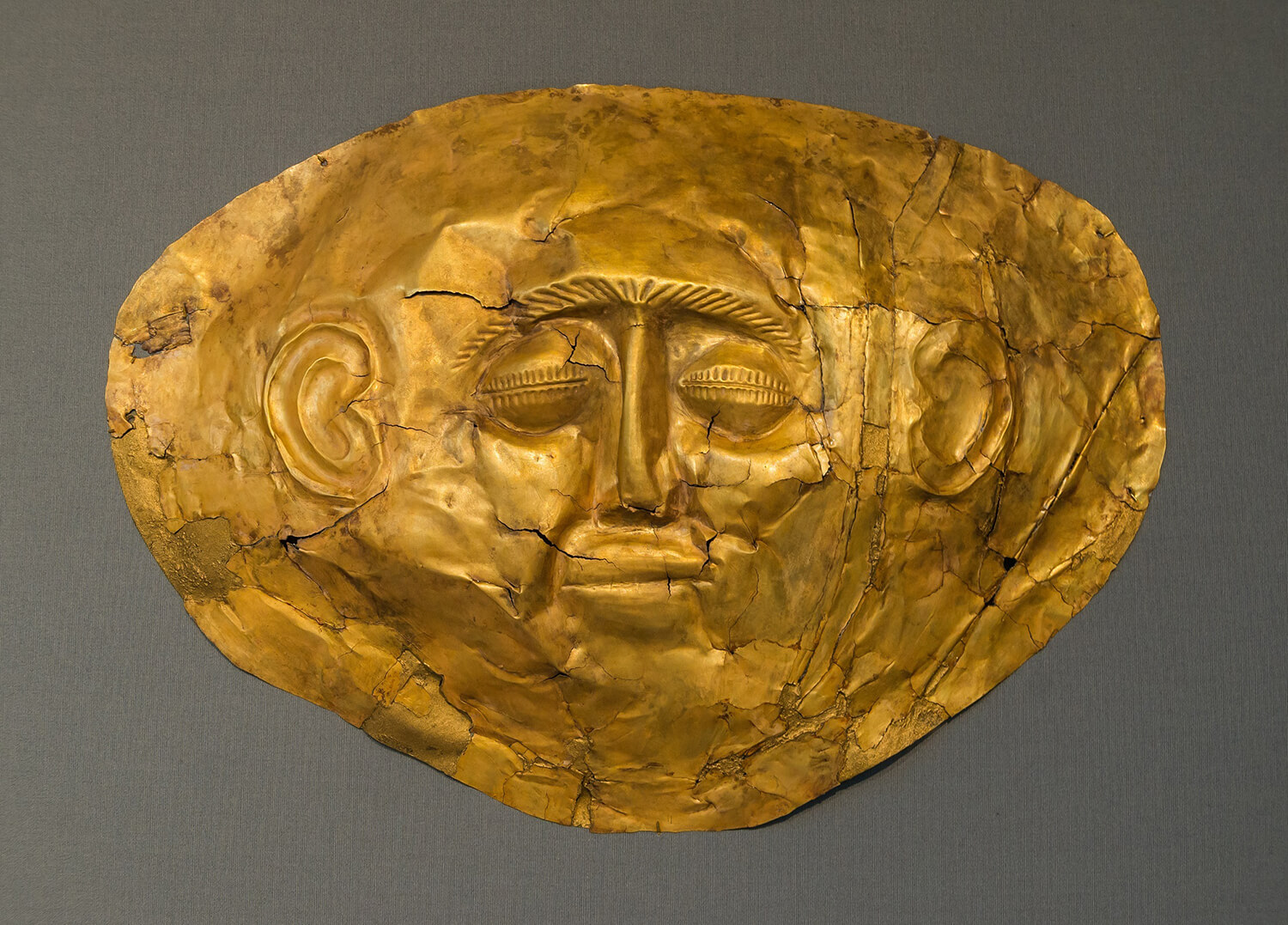
A golden funerary mask from a burial site titled Grave Circle A in the ancient Greek city of Mycenae.

Mycenae was once a stronghold of Greek civilization, with a population of 30,000, and is now a UNESCO World Heritage Site.

The snow-coated Mount Helmos, also known as Aroania, stands at 2,355m.
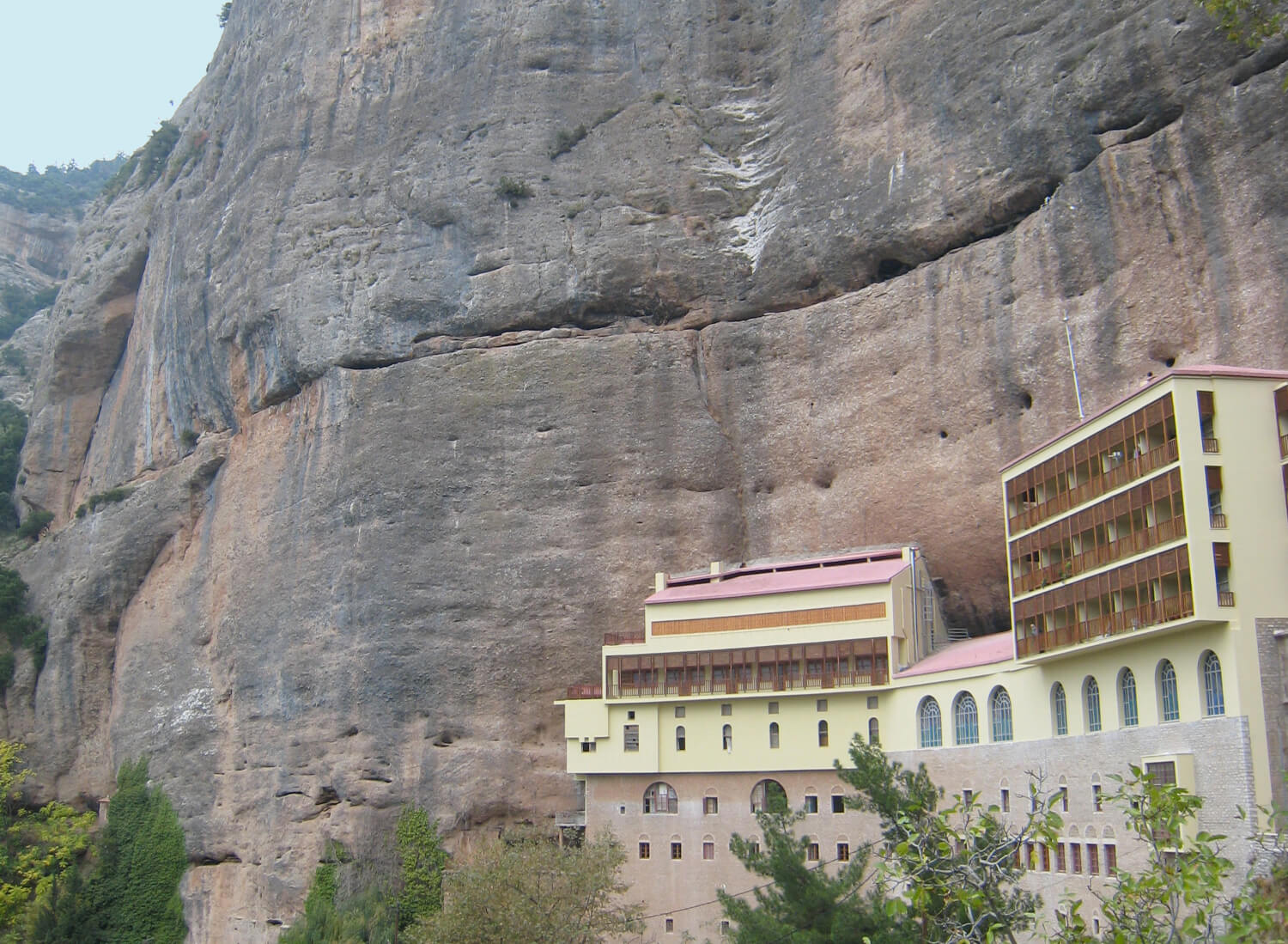
The Mega Speleo Monastery huddles beneath cliffs of syn-rift deposits in the Vouraikos valley. Founded in 362 AD, it is one of the oldest monasteries in Greece.
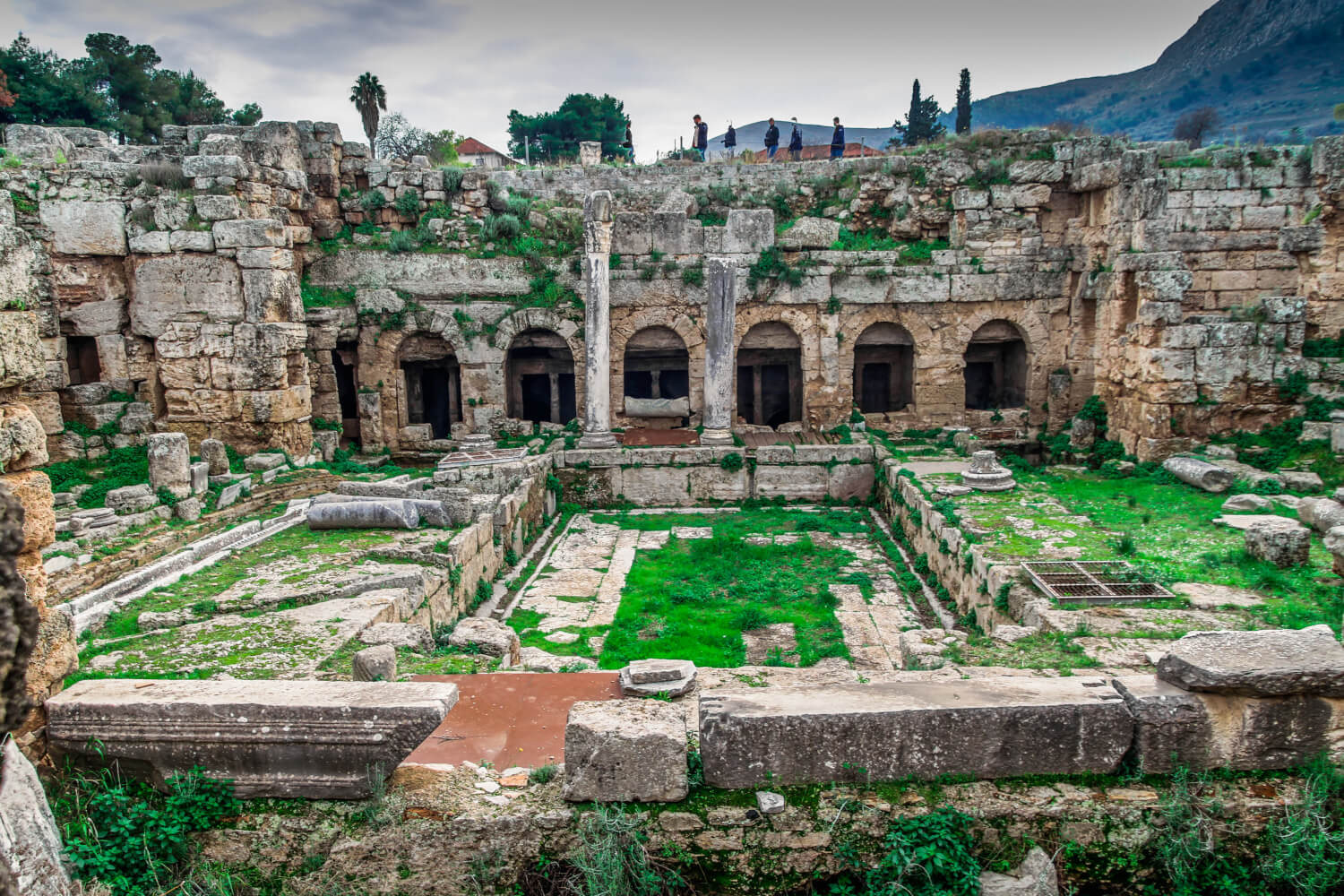
The ruins of Corinth.
